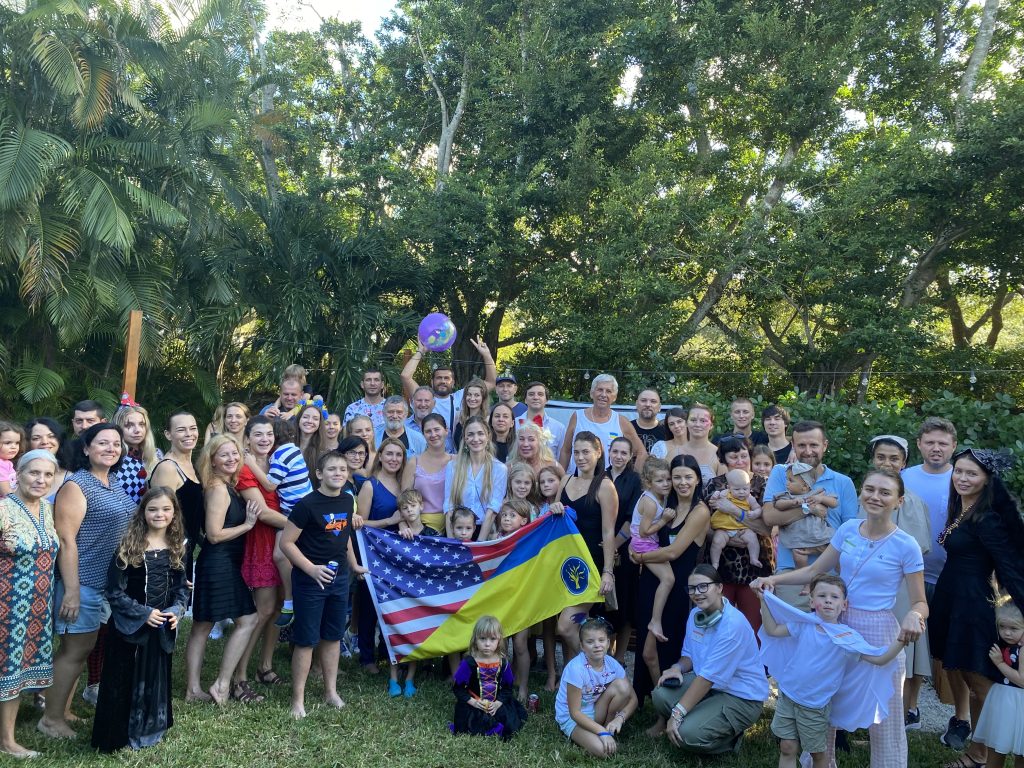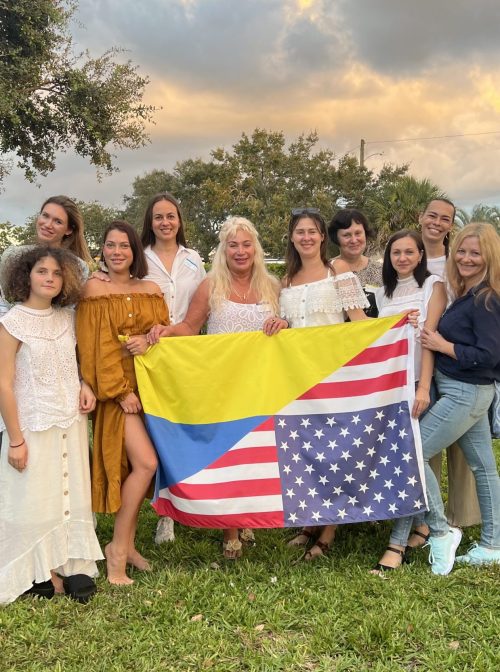Angie Watstein knows what it’s like to grow up in a refugee family.
In 1981, her family fled Ukraine and came to the United States. “I was one year old. I came with four generations of family, including four who were holocaust survivors.” They were fleeing a Soviet Union where their religious practice had been outlawed, and where antisemitism was rampant. An opportunity presented itself for her family to leave, and they took it, traveling for months through several European countries, and finally emigrating to the U.S. with legal and logistical help from the New York Association for New Americans.
When the war in Ukraine started last year, Angie knew she needed to act. “I felt like the world was treating it like another Holocaust. People around us were turning their heads and saying, ‘I’m not going to look at this right now.’” While Angie didn’t know what to do, she knew she had to help. She ran across a website that a couple of college students created called UkraineTakeShelter.com, which helped to connect Ukrainian refugees with Americans who could host them.

Angie and her husband Adam, who is a Rabbi, posted on the site, and within 24 hours, were contacted by a woman needing help. She had one suitcase, three small children, and no connections in America. Angie and Adam brought the family into their house. They didn’t ask if the family was Jewish (they weren’t) – all they knew was that the family needed help, and they were welcome to stay in the Watstein’s South Florida home.
Word got out, and Angie and her husband started getting emails every other day from new families seeking refuge. Angie mobilized her synagogue and a nearby Ukrainian Orthodox church to help. This was the beginning of the Ukrainian Refugee Resettlement Project, one of the most remarkable grassroots refugee support efforts in the country. It has since grown to over 150 volunteers working with 400 families working in Florida and beyond.
Angie isn’t the first person to create a faith-based refugee resettlement agency. In fact, many of the most important organizations in that space are faith-based, including Jewish Family Services and Church World Service. Angie’s in distinguished company, sometimes partnering with these organizations, and sometimes filling in where the larger organizations can’t reach. As the head of a small organization, she can move quickly when she sees a need.
Angie says that their work is guided by what the families need, not what the organization thinks they need. “I tell all the refugees ‘I can’t help you all the same.’ I’ll help them get what they need when they need it. If someone needs Medicaid, or benefits, or food, we’re helping them.”
It’s a tough job, and the number of hats she’s had to wear is staggering: volunteer coordinator, social service recruiter, school enrollment navigator, Medicaid expert, immigrant policy specialist, fundraiser, and media spokesperson to name a few. Every day brings a high-stakes challenge, and she does everything she can to meet it.
When I ask her about how her faith inspires this work, she says, “I’ve been praying for the last couple of years to be a soldier for God. I prayed and prayed ‘What can I do? Please show me the way.’ I don’t know where my energy comes from. I haven’t taken a salary. Every morning I wake up. I don’t get exhausted from it.”
She’s burning with the fire that does not consume.
Hosting refugees has affected Angie and the others who have opened their homes. “It’s been really amazing. Everyone is affected differently. Some feel the trauma. Even myself, after listening to the families talk about the bombs, I’ll jump when I hear lightning and thunder. It’s a lot of heavy emotion. The host gets a little of the trauma the families are going through. Often, the hosts end up crying with the refugee.”
Angie and her volunteers have decided to be more than spectators to one of the biggest crises of our time. “We’re going to look at the problem and do something. You have to make peace with your own hands.”
For more information on the Ukrainian Refugee Resettlement Project, including how to donate and how to become a host, go to urrpfl.org
For the past two decades, Jeff Pinzino has helped to make visionary social change projects real. Whether developing a mobile market to bring fresh produce to food deserts or co-founding a housing co-op for activists, he has brought creativity, expertise, and resourcefulness to bear in creating social change. Jeff has professional experience in community organizing, social entrepreneurship, philanthropy, fundraising, management and training. He has a passion for projects committed to economic justice and racial equity, especially those that engage human creativity and connectedness to transform communities. Some of his previous titles include Sr. Director of Development, External Relations of the Illinois Coalition for Immigrant and Refugee Rights, Development Director of New Orleans Works Center for Racial Justice, and Chief Operating Officer of Resilience Force.




